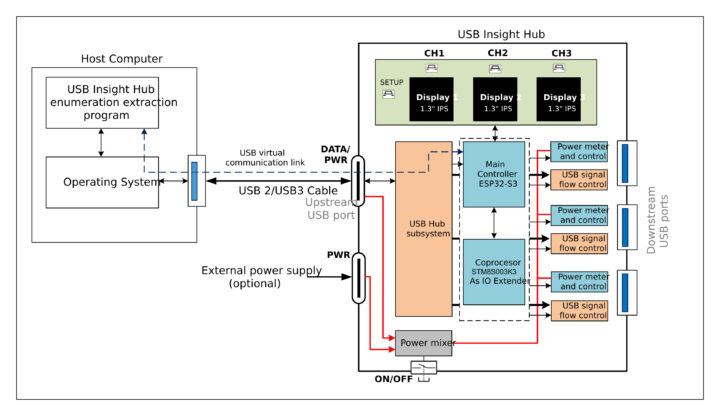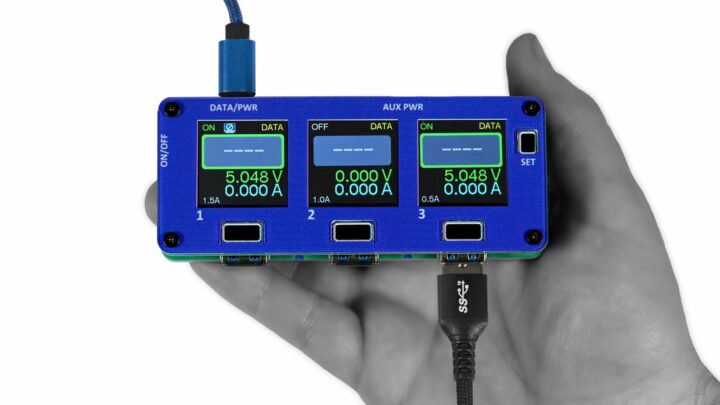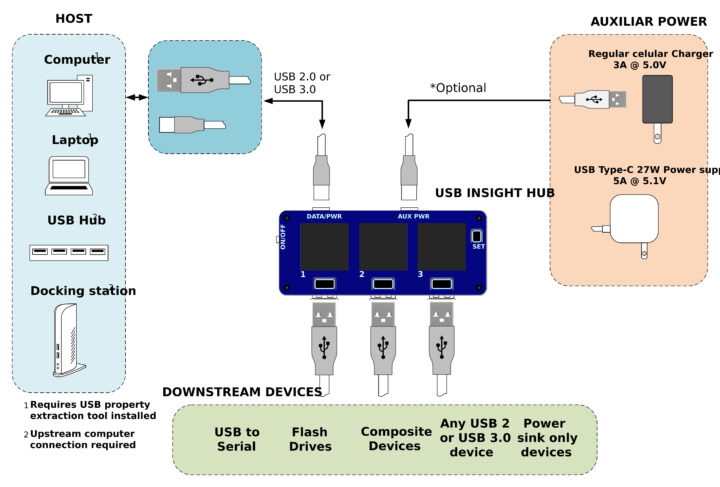The USB Insight Hub is a USB testing tool based on the ESP32-S2 wireless SoC made by Ecuador-based company Aerio Solutions SAS and aimed at developers and tech enthusiasts.
The Insight Hub connects to a computer via a USB Type-C port and expands it to three downstream ports, each with a 1.3-inch color display screen that displays information about the serial device such as its assigned enumeration name, voltage, and current. The enumeration name displayed helps to identify all virtual ports running through the Insight Hub. This feature is quite handy when multiple devices are connected.
Although the hub features a Wi-Fi-enabled SoC, it doesn’t currently support wireless networking. Each downstream port is connected to a dedicated voltage and current meter for real-time feedback. Also, the hub implements configurable short-circuit, over-current, and back-current protection. It also allows you to control the individual activation and deactivation of the D+/D- data lines of each downstream port to force enumeration and support per-port power and data disconnect. There is a global power button for controlling device-wide power.
While it shares some similarities with Capable Robot’s Programmable USB Hub and the Cambrionix PowerPad 15S, the Insight Hub is a fairly modest product dedicated to “eliminating small inconveniences that add up.” We have also covered the UM25C USB power meter which tracks voltage, current, and overall power consumption of USB devices.
USB Insight Hub specifications:
- MCU – ESP32-S2-MINI-2 module with Espressif ESP32-S2 single-core Xtensa LX7 processor @ up to 240 MHz with 320KB SRAM, 128KB ROM, and WiFi 4 connectivity
- Co-processor – STMicro STM8S003K3, 8-bit MCU with 8KB flash, 16MHz CPU and integrated EEPROM
- Display – 3x 1.3-inch color IPS TFT displays (240×240) with 170° viewing angle, 250 NITs
- USB Interface
- Renesas uPD720210 4-port USB 3.0 Hub controller (supports Low, Full, High, and Super Speed USB)
- Input – 1x USB 3.0 Type-C port for data and power (up to 3 A @ 5.5 V)
- Output – Three downstream USB 3.0 Type-A ports (Individual USB 2.0 D+/D- switches for each port)
- Expansion – STEMMA QT JST SH connector, 4x IO in PCB header
- Misc
- 3x buttons for power and data control
- 1x setup button
- Global on/off switch
- 32 mm (horizontal) spacing between ports
- Power
- 1x USB Type-C connector for auxiliary power up to 5A @ 5.5V
- Microchip PAC1943 as a dedicated power and energy monitor for downstream ports (1mA and 1mV resolution)
- Hardware current protection via AP22653 power switches on each downstream port (<6ms reaction time)
- Software overcurrent and reverse current protection configurable in 1 mA steps (< under 20ms reaction time).
- Electrostatic discharge (ESD) protection
- Dimensions – 110 x 45 x 21 mm

Concerning firmware/software, there are currently Windows, Linux, and macOS drivers for the Renesas uPD720210 chip and Arduino firmware for the ESP32-S2 SoC. A companion app runs on the host computer and extracts enumeration data for the USB ports for display on the 1.3″ screens. This extraction app is currently available for Windows, but work is ongoing for the Linux and macOS versions.
The USB insight hub is open-source, with hardware schematics (PDF) available on GitHub. The software part is slated to be released after organization/optimization.
The USB Insight Hub campaign is currently live on Crowd Supply with a funding goal of $10,000. The device is priced at $119 and is sold in a non-customizable, acrylic enclosure, with a 1-meter USB Type A-to-C cable in the package. Shipping costs $8 extra within the United States and $18 to the rest of the world and is expected to commence by July 10, 2025.

Tomisin is a writer specializing in hardware product reviews, comparisons, and explainers. He is very passionate about small form factor and single-board computers.
Support CNX Software! Donate via cryptocurrencies, become a Patron on Patreon, or purchase goods on Amazon or Aliexpress






